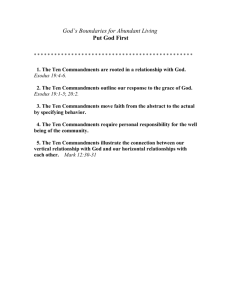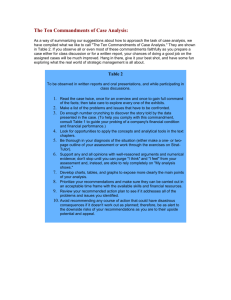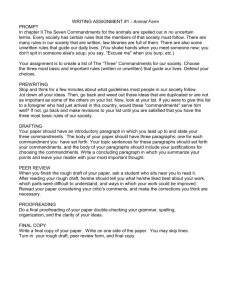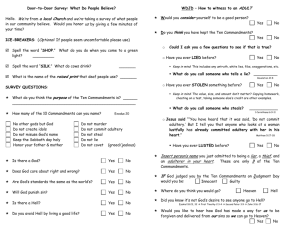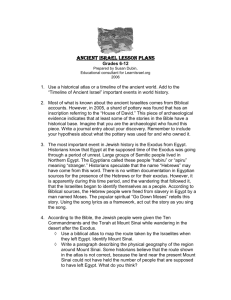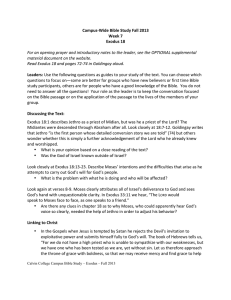Document 14396639
advertisement
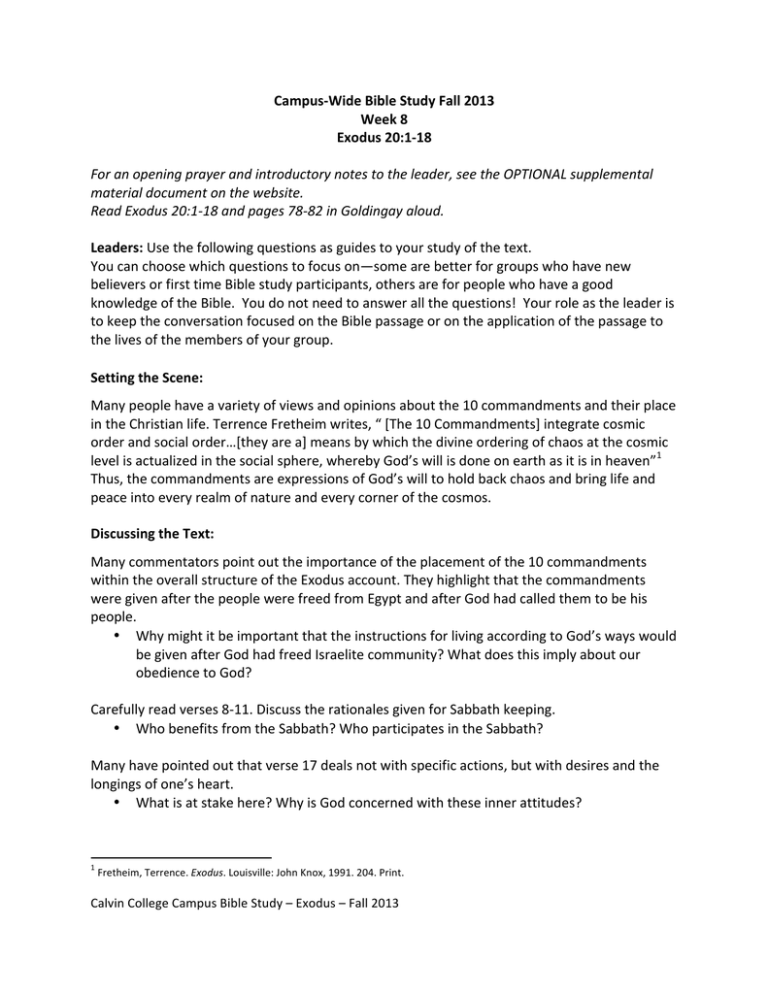
Campus-­‐Wide Bible Study Fall 2013 Week 8 Exodus 20:1-­‐18 For an opening prayer and introductory notes to the leader, see the OPTIONAL supplemental material document on the website. Read Exodus 20:1-­‐18 and pages 78-­‐82 in Goldingay aloud. Leaders: Use the following questions as guides to your study of the text. You can choose which questions to focus on—some are better for groups who have new believers or first time Bible study participants, others are for people who have a good knowledge of the Bible. You do not need to answer all the questions! Your role as the leader is to keep the conversation focused on the Bible passage or on the application of the passage to the lives of the members of your group. Setting the Scene: Many people have a variety of views and opinions about the 10 commandments and their place in the Christian life. Terrence Fretheim writes, “ [The 10 Commandments] integrate cosmic order and social order…[they are a] means by which the divine ordering of chaos at the cosmic level is actualized in the social sphere, whereby God’s will is done on earth as it is in heaven”1 Thus, the commandments are expressions of God’s will to hold back chaos and bring life and peace into every realm of nature and every corner of the cosmos. Discussing the Text: Many commentators point out the importance of the placement of the 10 commandments within the overall structure of the Exodus account. They highlight that the commandments were given after the people were freed from Egypt and after God had called them to be his people. • Why might it be important that the instructions for living according to God’s ways would be given after God had freed Israelite community? What does this imply about our obedience to God? Carefully read verses 8-­‐11. Discuss the rationales given for Sabbath keeping. • Who benefits from the Sabbath? Who participates in the Sabbath? Many have pointed out that verse 17 deals not with specific actions, but with desires and the longings of one’s heart. • What is at stake here? Why is God concerned with these inner attitudes? 1 Fretheim, Terrence. Exodus. Louisville: John Knox, 1991. 204. Print. Calvin College Campus Bible Study – Exodus – Fall 2013 Linking to Christ • In Matthew 22 Jesus is questioned about the law and asked “what is the greatest commandment in the law?” He responds by saying in 22:37-­‐40 “‘Love the Lord your God with all your heart and with all your soul and with all your mind.’ This is the first and greatest commandment. And the second is like it: ‘Love your neighbor as yourself.’ All the Law and the Prophets hang on these two commandments.” How might these words of Jesus help us to interpret the 10 Commandments and their purpose and function? Discussing the Place of the 10 Commandments Today The 10 Commandments were given to a particular people at a particular point in their history (after God has freed them) in order to form them as representatives of God and God’s ways to the rest of the world. Sometimes debates arise about displaying the commandments in public places. Peter Enns thinks this is a bad idea because people are in need of a complete renovation, “from the inside out,” he says. Therefore, “They do not need their moral gyroscopes pushed in the right direction,[as displaying the commandments might attempt to do] but the Spirit of the risen Christ breathed into them”2 • Discuss this statement and implications about publicly posting the 10 commandments. Discussing the World From your experience, do Christians, yourself included, ever think that they can court God’s favor and love through obedience and service? • If God is not impressed by our morality, what is the point of obedience to God? John Calvin said that human nature is “a perpetual factory of idols,” claiming that we are always busy making other gods for ourselves and putting things before God. • If God is stronger than any force of oppression, why do we run after other gods? If God is stronger than death and promises his Spirit to guide us forever, why are they even alluring to us? Discussing the Sabbath, Victor Hamilton points out that in no other text in Scripture is there “anything God is or does that identifies him as holy and that we can do too”3 (339). In other words, we can participate in God’s holiness and pattern of life by observing the Sabbath. The crazy thing about this imitation of God is that all we have to do is stop working and acknowledge God’s sovereignty and grace over us and the whole world and we are imitating God, becoming, or acting like God. This flies in the face of the idea that holiness is only found in action and accomplishments. Why then is it so hard for us to stop working? • What keeps us from resting? What keeps us from joy, what helps us live in joy? 2 3 Enns, Peter. Exodus. Grand Rapids: Zondervan, 2000. 433. The NIV Application Commentary. Print. Hamilton, Victor. Exodus: An Exegetical Commentary. Grand Rapids: Baker Academic, 2011. 339. Print. Calvin College Campus Bible Study – Exodus – Fall 2013 • What is the connection between resting and joy, resting and doing good work? Calvin College Campus Bible Study – Exodus – Fall 2013
